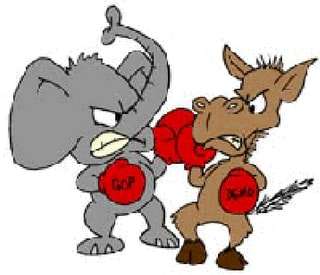The Volokh Conspiracy
Mostly law professors | Sometimes contrarian | Often libertarian | Always independent
Public ignorance about the composition of the parties - and why it matters

In a helpful recent post, Matthew Yglesias of Vox summarizes an important recent study which shows that most Americans massively misperceive the composition of the two parties. They tend to massively overestimate the percentage of Republicans who are rich, evangelicals, or elderly, and the percentage of Democrats who are black, gay or lesbian, union members, or atheists and agnostics:
When you survey Americans, they estimate that a staggering 38 percent of Republican Party supporters earn more than $250,000 a year.
This is impossible, because only 1.5 percent of Americans live in households that have incomes that high. It's even more off base when you consider that rich people are actually much more likely to be Democrats than Republicans. So overall, the total share of Republicans who earn more than $250,000 a year is quite small.
Conversely, Americans also say they believe that nearly a third of the Democratic Party's supporters are gay or lesbian, and that something like 40 percent are African-American.
Again, this is another wild overestimate, because fewer than 4 percent of Americans identify as gay, lesbian, or transgender, and only about 20 percent of Democrats are African-American.
People have a more skewed perception of the opposing party than their own. Interestingly, the study finds that partisans who pay closer attention to politics have the most skewed perceptions of the parties' supporters (though those who pay less attention still tend to be badly off). That is likely because they are more attuned to standard stereotypes about the parties:
Highly informed Democrats "know" that Republicans are just a bunch of old, rich, Southern evangelicals, while highly informed Republicans "know" that Democrats are gay, black union members. The banal reality that the median member of both parties is a middle-aged, middle-class heterosexual white person gets obscured not by ignorance but by knowledge.
This is one of the unusual situations (discussed in Chapter 2 of my book on political ignorance) where increased knowledge in one area actually contributes to ignorance about another. People who follow politics relatively closely are more likely to know which groups disproportionately support which party. But, unless you know the actual numbers, it's easy to leap to the intuitive (but often false) conclusion that a group that is overrepresented within some organization actually dominates it, or at least constitutes a very high percentage of the total membership.
These kinds of misperceptions about the parties are far from the worst examples of widespread political ignorance. But they are also far from being completely harmless. As the authors of the study point out, "when provided information about the actual share of various party-stereotypical groups in the out-party, partisans come to see supporters of the out-party as less extreme and feel less socially distant from them. Thus, people's skewed mental images of the parties appear to fuel contemporary pathologies of partisanship."
If you think that the other party's supporters mostly come from a few narrow economic, religious, or demographic groups, it becomes easier to dismiss their ideas out of hand (especially if the groups in question seem alien or socially distant from yourself). Such misperceptions thereby increase hostility between the parties' supporters and exacerbate the already severe problem of partisan bias.


Show Comments (0)